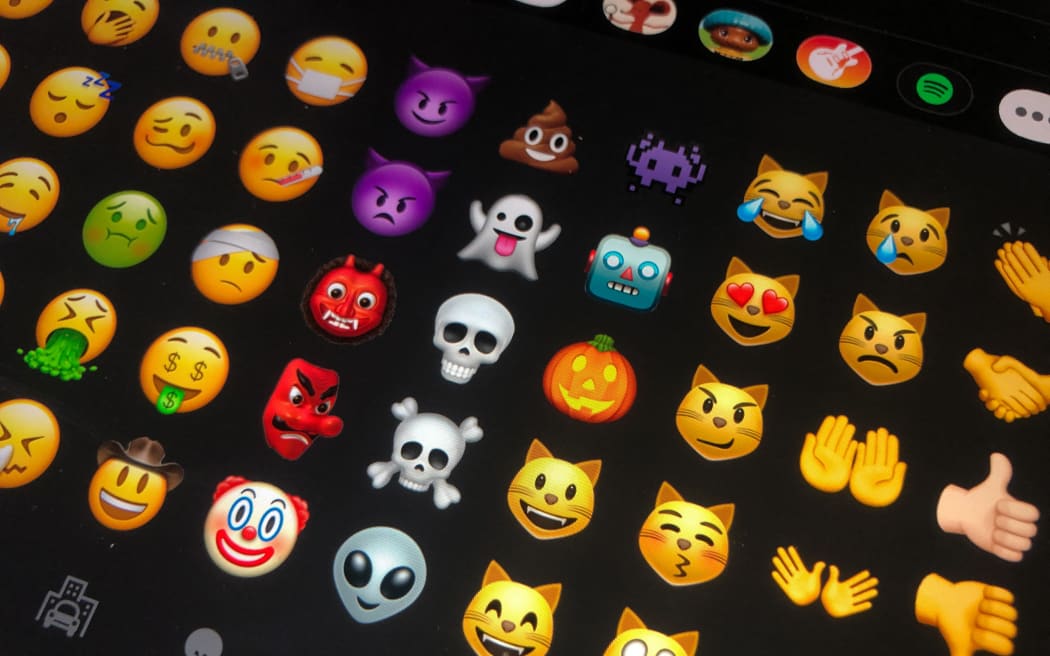Content warning: This story discusses domestic violence.
How many times a day would you fire off an emoji - those little icons that have become an online language of their own?
Everything from a heart or thumbs up to a smiling poo. But it seems they could have much bigger legal implications.
So when can an emoji constitute a threat or harassment?
Or seal a legally binding deal?
Australia Deakin University professor of law Marilyn McMahon told Checkpoint while it was rare emojis by themselves were sufficient enough to constitute a threat, they did show up in legal cases.
"I think that perhaps people forget that online communications can convey threat and intimidation and harassment just as inter-personal comments and statements can do those things."
McMahon said this could be seen in a 2017 domestic violence case here in Aotearoa.
"A man had separated from his ex-partner and they had a poor relationship - she'd taken out an intervention order against him - and he... put on her Facebook page a message that said 'You're going to get it' accompanied by a plane emoji. So the threat is there in text.
"The court that considered the matter actually decided that the plane emoji added, or compounded the threat because in those circumstances, they lived on different islands and the plane really signified how he was going to get to her."
McMahon said court found him liable for breaching the order.
Courts were reluctant to accept a 'just joking' defence, she said.

Photo: Jörg Carstensen / dpa Picture-Alliance via AFP
"We've got several instances where there's been a history of domestic violence by a man towards his partner and then there's been a post online."
There have been two cases in which a thumbs up emoji was ruled legally binding, McMachon said.
In Canada, a farmer offered grain for sale and a buyer made an offer. The farmer responded with a thumbs up emoji.
"The farmer did not want to go ahead with the sale because prices had increased subsequently and he thought he could do better so he tried to avoid this sale saying that the thumbs up emoji really wasn't the finishing of the contract."
The Canadian judge did not accept that and ruled it constituted the making of a legal contract, she said.
"There was a preceding case in Israel in 2017 between a landlord and a prospective tenant where the tenant indicated through a series of emojis very positive - laughing, clapping, girls dancing, champagne corks. It looked like the prospective tenant had accepted the landlord's offer of a contract and then they defaulted, they just said we withdrew.
"The Israeli court in those circumstances said the exchange of messages, which again involved text as well as emoji, but the general [feeling] conveyed by emoji as well as the text, was very positive that the prospective tenant was accepting the agreement with the landlord."
The judge ordered the prospective tenant pay damages, she said.
So, what advice does McMahon have for people using emojis?
"Be careful about thinking that doing something like giving a thumbs up emoji after you've been negotiating with a tradesperson for example if you've agreed on a price or the tradesperson might have nominated a price to you and you sent back a thumbs up emoji, then potentially that might be a valid contract you just entered into.
"I think we should be accepting that emoji can have meaning and can for example, in context, be interpreted perhaps as signifying, in those circumstances, entering into a valid contract."
Where to get help:
Women's Refuge:(0800 733 843
It's Not OK 0800 456 450
Shine: 0508 744 633
Victim Support: 0800 842 846
HELP Call 24/7 (Auckland): 09 623 1700, (Wellington): 04 801 6655 - push 0 at the menu
The National Network of Family Violence Services NZ has information on specialist family violence agencies.
If it is an emergency and you feel like you or someone else is at risk, call 111.

